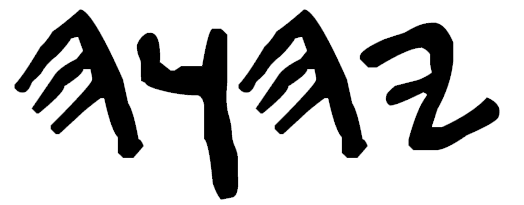Where Did “Jehovah” Come From?
Where Did “Jehovah” Come From?
[EDITOR’S NOTE: AP auxiliary writer Dr. Rogers is the Director of the Graduate school of Theology and Associate Professor of Bible at Freed-Hardeman University. He holds an M.A. in New Testament from Freed-Hardeman University as well as an M.Phil. and Ph.D. in Hebraic, Judaic, and Cognate Studies from Hebrew Union College-Jewish Institute of Religion.]
The personal name of God in the Hebrew Bible is יהוה (YHWH). Occurring over 6,800 times in the Old Testament, this name is by far the most common way of referring to God. Translations and traditions have developed a number of ways to represent this name respectfully without crudely spelling out “Yahweh.” English translations have typically chosen “Lord,” following the custom intitated by the Septuagint, and perpetuated in the Latin Vulgate. Normally, the small caps typeset (“lord”) is used in mass-produced English translations to mark YHWH as the underlying Hebrew, as opposed to “Lord,” which normally renders the Hebrew ’ādôn. Some Jewish traditions, however, choose to render YHWH as “HaShem” (literally, “the name”). The ASV (1901) is unique among mainstream translations in opting for “Jehovah” as the preferred translation for YHWH. To be clear, none of these renderings is a translation per se. They are merely reflections of respect for the personal name of God.
Respect for the Name of God
Respect for the personal name of God was an established custom already in the earliest history of Israel. Proper esteem for the Name is one of the Ten Commandments (Exodus 20:7; Deuteronomy 5:11), and cursing the Name is a sin punishable by death (Leviticus 24:10-16). After all, one’s name stands in for his or her essence (which is why changes of names are important). With the Bible placing such importance on the name of God, it is no surprise to find Jewish people in the post-biblical period going to great lengths to reverence the name YHWH.
Some Dead Sea Scrolls manuscripts have the name of God in Paleo-Hebrew, a more archaic form of the Hebrew language. Instead of יהוה in the traditional block characters, the name of God in Paleo-Hebrew appears as  . The name of God is the only word in those manuscripts written in this fashion—indicating respect. Likewise, when the translators of the Old Testament into Greek rendered the personal name of God, they chose the Greek word κύριος (kyrios), meaning “lord.” This may indicate that Jews as early as the third century B.C. were already pronouncing the Hebrew term אדון (’ādôn), meaning “Lord,” when they encountered YHWH in the text. Fear of mispronouncing the holy, personal name of God perhaps led them to develop the custom of not pronouncing it at all. Consequently, we have no sure idea how the name ought to be pronounced at any stage of the language.
. The name of God is the only word in those manuscripts written in this fashion—indicating respect. Likewise, when the translators of the Old Testament into Greek rendered the personal name of God, they chose the Greek word κύριος (kyrios), meaning “lord.” This may indicate that Jews as early as the third century B.C. were already pronouncing the Hebrew term אדון (’ādôn), meaning “Lord,” when they encountered YHWH in the text. Fear of mispronouncing the holy, personal name of God perhaps led them to develop the custom of not pronouncing it at all. Consequently, we have no sure idea how the name ought to be pronounced at any stage of the language.
Where Did “Jehovah” Come From?
The word “Jehovah” is a Medieval mistranscription from the Masoretic Hebrew Bible. It takes the consonants of the divine name YHWH and combines them with the vowels of another Hebrew word, ’adōnāy (“my lord”). How such a combination occurred might be worth explaining a little more, so we begin by discussing briefly the consonantal nature of the Hebrew language and the Masoretic vowel additions.
Hebrew is a language of consonants. Vowel sounds are spoken of course, but are not traditionally written. This custom dates to ancient times. As a result, we are unable to determine exactly how the Hebrew language in the Old Testament era was pronounced. Concern, however, to preserve the precise pronunciation of the text led a group of Jewish scribes in the Middle Ages, known as the Masoretes, to invent and apply vowel symbols to the traditional consonantal text. The two oldest manuscripts of the Masoretic Hebrew Bible—the Aleppo and Leningrad codices—feature these vowel markings.
Jewish scribes were very traditional, and thus scrupulously copied the text exactly as they received it, even if they were certain they were passing along an erroneous reading. When the Masoretes encountered a text they believed to be corrupt, or one that made no sense when read publicly, they marked the word or phrase with a marginal correction known as the qerî, literally meaning “it is read.” What was copied in the body of the text came to be known as the ketîv (“it is written”). When one read the Hebrew text publicly, he was supposed to replace the ketîv with the qerî for the sake of accuracy, or, in the case of the name of God, respect. The name of God is the most common ketîv/qerî combination in the Hebrew Bible. Because the name of God is so common, however, the Masoretes simply placed the vowels of the qerî around the ketîv rather than utilizing the marginal system.
The Masoretic manuscripts of the Hebrew Bible reflect the ancient custom of pronouncing ’adōnāy (ah-dohn-EYE) as the qerî in place of YHWH as the ketîv. The term ’adōnāy is a fitting choice of qerî. First, the noun ’ādôn occurs 775 times in the Old Testament, over 400 times in reference to God. Second, the suffix –āy is a marker of the first person singular (in address), making the qerî appear as a personal claim on the part of the reader. In other words, the public reader of Hebrew Scripture is understood to mean “My Lord said to Moses,” or “Let them praises give my Lord.” This was intended as a symbol of respect, but the need for a more literal rendering of the name of God than the standard “Lord” created the desire to use this made-up Masoretic term in English transliteration.
The word “Jehovah” first appears in A.D. 1381. It is easy to understand where it came from. Someone simply transcribed the Masoretic qerî into a European language. In other words, someone simply took the vowels of ’adōnay and placed them around the consonants of YHWH. This yields the name “Jehovah,” more or less. The Aleppo and Leningrad Codices of the Hebrew Bible write the nonsensical יְהוָה (YeHVāH), which takes the vowels of ’adōnay (except for the ō) and places them around the consonants of YHWH. They attempt to preserve in writing a tradition of reading.
English readers are probably wondering exactly how YeHoWaH becomes Jehovah. To explain, the Y in English represents the sound J in certain other languages. The raised e is a “half-vowel,” and represents a hurried sound of barely distinguishable vocalic value (this is why ’adōnāy starts with an a, but the Masoretes point YHWH with an e). This “shewa,” as it is often called, is transcribed as e in the European languages. H is H. The long ō sound is reinserted (absent in the Masoretic qerî) from ’adōnāy. W is pronounced in many languages as the English v. The ā of ’adōnāy is represented as a. And, again, H is H. Taken together, this yields the word “Jehovah.”
The name Jehovah fell into fashion in early English translations. Tyndale, the Geneva Bible, and others used the term Jehovah, at least some of the time, to represent the Hebrew YHWH. The term occurs only four times in the King James Version of the Bible (Exodus 6:3; Psalm 83:18; Isaiah 12:2; 26:4). A mixture of “Jehovah” and “Lord” remained consistent in most English translations. The English Revised Version (1885), and its North American counterpart the American Standard Version (1901), choose “Jehovah” as its standard rendering of יהוה (YHWH), a name it uses over 6,800 times. The New World Translation of the Jehovah’s Witnesses also consistently uses the name Jehovah. More recent translations have not followed suit, preferring “lord” to “Jehovah.”
The question arises, then, is “Jehovah” the real name of God? The answer is a clear and firm “no.” First, the Masoretes themselves would not allege “Jehovah” represents the name of God. As we have discussed, the ketîv is inspired and sacred, whereas the qerî is a Masoretic protection on the way the text ought to be read. By adding the vowels of ’adōnāy to YHWH, they never intended to create a new word, but to mark a respectful reading of the personal name of God.
Second, the vowel sounds the Masoretes added to the text represent a reading tradition much later than the biblical text itself. To get a sense of how much pronunciation can change in this length of time, watch online videos of the Canterbury Tales read with contemporary English pronunciation. Does this sound anything like modern English? Even if Hebrew pronunciation remained remarkably static over that period of time (a period of 1,000 years!), the fact that the name was not transmitted with vowels renders certainty in pronunciation simply impossible. The Masoretes preserved a reading tradition passed down in their time, not necessarily one dating to biblical times.
Third, the Masoretes did not actually give the name Jehovah or its Hebrew equivalent. Remember, the Masoretes omit the ō vowel from the qerî, yielding the nonsensical Hebrew word YeHWāH (it is nonsensical since every Hebrew consonant must have an accompanying vowel; the middle “H” does not). So, the builders of the make-believe word “Jehovah” added something the Masoretic Hebrew does not have in the first place.
Conclusion
The term Jehovah is less than 700 years old. Even its Hebrew near-equivalent can date no earlier than the Masoretic application of vowels to the consonantal text in the Middle Ages. The same holds true for the spelling “Yahweh,” although scholars feel confident this form is much closer to the original pronunciation (based partially on ancient transliterations). That said, is it more respectful to use the name Jehovah? Some think so. Those who stringently defend the use of the name Jehovah argue their position on the basis of its being more literal and more original. However, we have observed that the term “Jehovah” is neither original to the Bible nor to the Masoretic tradition. And it is simply inaccurate to use an English transliteration of a Hebrew word that was never intended to be pronounced in the first place. The Jewish tradition is careful not to misuse the personal name of God, distancing itself with epithets such as “the Lord” or “the Name.” A biblical Israelite, if transported to modern times, would not understand what “Jehovah” even meant since it isn’t actually a Hebrew word. The name Jehovah is no more literal, no more respectful, and no more accurate than the more commonly used lord.

REPRODUCTION & DISCLAIMERS: We are happy to grant permission for this article to be reproduced in part or in its entirety, as long as our stipulations are observed.



0 Comments:
Post a Comment
<< Home